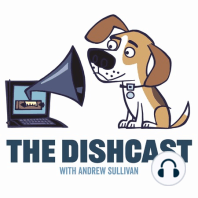20 min listen
Bryan Caplan On Open Borders
ratings:
Length:
20 minutes
Released:
Jun 11, 2021
Format:
Podcast episode
Description
Bryan, who teaches economics at George Mason University, is the author of the graphic nonfiction NYT bestseller Open Borders. His views on immigration, nation-states, and democracy are extremely different from my own, so we debate all throughout the episode. Bryan has been the most recommended guest by our readers, who clearly want to see some fireworks on this issue. I had a lot of fun.You can listen to the episode right away in the audio player embedded above, or right below it you can click “Listen in podcast app” — which will connect you to the Dishcast feed. To hear three clips of my conversation with Bryan — on whether a country’s citizens should have any say over immigration; on whether adding a billion people to the U.S. is wise or feasible; and on whether voting is irrational “poetry”, as Bryan puts it — head over to our YouTube page.Meanwhile, a wave of reader email came in after our episode with Jonathan Rauch, the most email we have received for any guest. Many of them are below, starting with this reader:This was an excellent podcast. Jonathan Rauch is kind and articulate, a great combination, and your dialogue was a great mixture of respectful conflict between the two of you and time for each of you to make your cases.In light of a new opinion piece in the NYT, “Cancel Culture Works: We Wouldn't Have Marriage Equality Without It,” and throwing in some of Rauch’s ideas, I wonder what you think about this: Democrats and those to the left of center have long been accused of playing too nice. Republicans began by using negative ads — tactics that didn’t begin but coalesced under Trump — and progressed to outright threats and naked power plays used to punish wayward thinkers. Democrats, on the other hand, wouldn’t attack each other and generally held on to the idea of building relationships and playing nice much longer. The problem is the negative ads worked. The threats worked. All of Trump’s disgusting tactics worked. Mind you, I do believe the Republicans may be hurting themselves in the long run, but in the short run, they’ve got loyal politicians, courts and state legislatures packed with like-minded conservatives, voting districts drawn to favor themselves, and an electorate — approximately half the country — that supports them through thick and thin.It seems to me that cancel culture and its wokeists are simply taking on the same cutthroat tactics. They’re tired of losing and being the nice guys. The culture has taught them to be more cynical, that long-term persuasion is too soft, takes too long, is too vulnerable to being undermined in the short term. Case in point is the example of that Times op-ed. I don’t know if the author is right that gay marriage needed to start threatening opponents’ livelihoods and positions in order to win, but it probably didn’t hurt, at least along with the more typical persuasive techniques. If one side continues to use cutthroat, anti-liberal (in the Rauch sense of the word) tactics that tear to shreds the slow, persuasive, long-term techniques of those following a more traditional, liberal model, what are the Democrats then left with?To be quite frank, I think Sasha’s argument was more good op-ed provocation than serious analysis of how marriage equality won. You win by shifting public opinion, which shifts the incentives of politicians. And, more importantly, that makes the advances stick. A reader dissents over my perspective on the pod:First of all, the Jonathan Rauch podcast was excellent. One of the best in a while. But I was gobsmacked that you could not concede that the danger of Donald Trump and the Republican disinformation campaign was a greater threat than what’s going on at the New York Times. You’ve truly lost the forest for the trees and it’s incredible, but sad, to watch. When you started your podcast I couldn’t imagine that I wouldn’t listen to every episode; I’ve been a fan for 20 years. But I don’t because so much of it is just you ranting against CRT and the
Released:
Jun 11, 2021
Format:
Podcast episode
Titles in the series (100)
Emily Yoffe On Due Process And Campus Rape by The Dishcast with Andrew Sullivan
